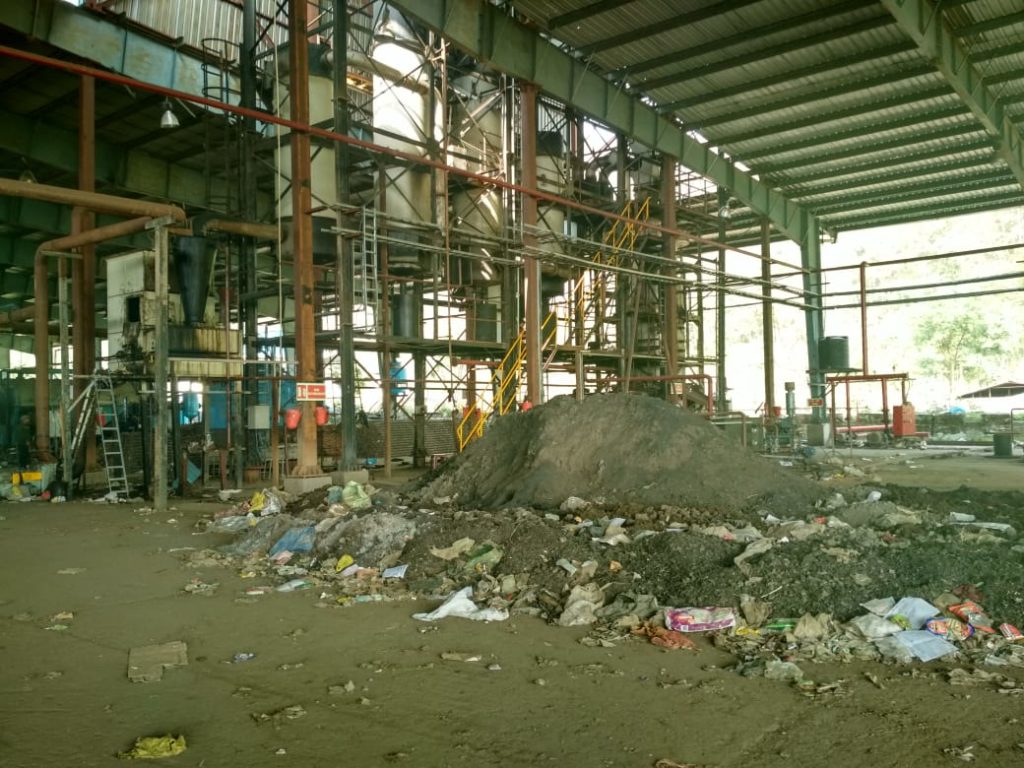Imphal city, which roughly has a population of about 3 lakhs, generates 110 metric tonnes of solid waste daily.

Garbage or solid waste management has always been an issue with limited open space plaguing cities and towns. Ever growing population, rising living standards and increasing migration to the city from the village are compounding the issue further.
Thankfully the concept solid-waste management has gone to fundamental changes – from disposing the solid waste in open spaces, unpaved streets and roadways, to scavengers carting waste to dumps outside city walls and the technological approach of solid-waste management, involving collecting, treating, recycling those that are still usable and disposing of solid material that has served its purpose or is no longer useful. Use of watertight garbage cans, sturdier vehicles for collection and transportation wastes and incinerating solid waste are latest development in the field.
Despite the developing technological approach to solid waste management, Manipur or Imphal city has a lot of catching up to do. Solid wastes are still being dumped in open space on land and in water causing adverse effects.

Imphal city, which roughly has a population of about 3 lakhs, generates 110 metric tonnes of solid waste daily. As of now, the Imphal Municipal Corporation, IMC, responsible solid waste management, is able to collect and dispose only about 50 % of the waste.

As a result, the remaining 50% of the waste invariably land up in the two rivers – the Imphal and Nambul Rivers – meandering through the city and eventually flowing on to the hottest tourist destination of Manipur, Loktak Lake, and the largest fresh water lake in East India.
Incidentally water experts from the Manipur State Ecology department had declared the water of Nambul extremely toxic during a survey, conducted in 2018. To arrest further pollution of the said rivers, Manipur Government launched the rejuvenation and conservation projects since March 2019 under National River Conservation Plan of the Union Ministry of Environment, Forests and Climate Change, Government of India.
The project plans to control pollution of river water quality by intercepting and treating all the urban wastewater outfalls from the polluted stretch of the rivers by using latest technology of water treatment plan in the outskirt of Imphal.
“As a measure of solid waste disposal, the Imphal Municipal Corporation and few NGOs are currently collecting the disposed waste from the main city market areas and from the households of 27 wards of the city. Lack of enough waste disposal area is our main problem,” lamented Kiyam Chandrakumar Singh, Commissioner, and IMC.
He further added that the solid waste are disposed at the Solid Waste Treatment Plant at Lamdeng, Imphal West District of Manipur constructed by the State Government under the theme “waste to energy” and out-sourced to a private firm called Innovative Eco-Care Pvt. Ltd, Ahmedabad.
The Lamdeng Solid Waste Management Plant is mandated to convert waste to energy like bio-city compost and electricity. So far the plants have processed 1150 metric tonnes of bio-fertilizers since December 2016 till October 2018.
As regards electricity generations, the plant would need further up gradation to process 200 metric tonnes of wastes daily reveals the plant manager, RK Mahurjit Singh.
Recently, the locals of Lamdeng prohibited disposal of waste materials at the plant for nine days causing huge inconveniences as well as health concerns.
Residents of Lamdeng, who had been first to praise the solid waste management plant for its production of organic fertilizers that they had started using to very good effects on their fields have been complaining that because there is no concrete fencing and separate drainage of the plant, foul smells and scabies like skin issues have been spreading in the villages surrounding the plant.
When their demands for proper fencing and separate drainage system of the plant were not taken seriously by the plant authorities and the state government, local women of Lamdeng blocked the road leading to the Lamdeng plant and ban entry of waste disposal trucks continuously for nine days.
As a result, heaps of solid wastes were being piled up in different areas of the city, in the markets and in every localities of Imphal. Different parts of Imphal city had started emitting extremely pungent foul smell, creating health risks to the market women vendors, customers and passers-by.
While the recent impasses have been resolved with the government assuring to fulfill the demands of the locals, it has highlighted the fact that there is an urgent need for a drastic change in how the waste management systems work in Manipur.
It is extremely important to properly handle solid waste generated from the Imphal area by segregation at the source. It is also necessary to treat biodegradable waste by suitable methods like composting and vermi-composting.
For the success of solid waste management in Manipur, people awareness is exceptionally obligatory.
Hence, a massive awareness campaign in association with communities, NGOs, local clubs, students and other stakeholders needs to undertake actions to push for better implementation of the solid waste management in Imphal.
There is also need for focusing on making solid waste management a people’s movement by taking the issues, concerns and management of solid waste to the grassroots.


